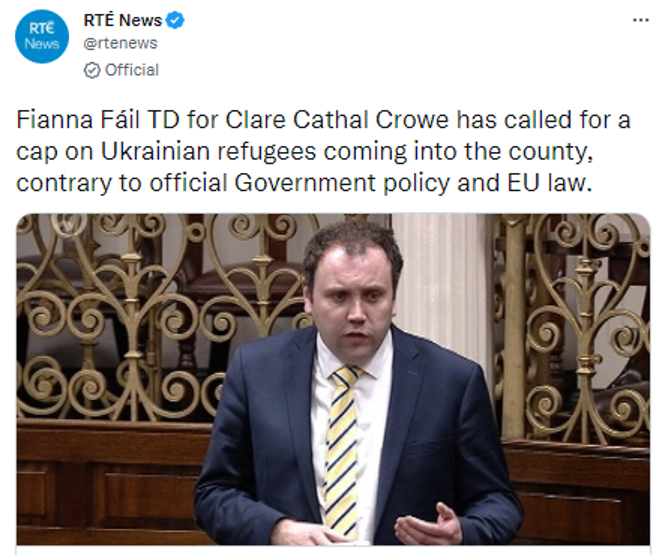What was interesting was that when the regime decided to go after him in the late 1940s they did not initially send the NKVD to kick his door down.
What they did instead was to use the allegedly independent Writers Union and the officially approved Novy Mir literary journal to first refuse to publish Pasternak and then denounce him as a “black sheep.” In typical Stalinist fashion all of this was used as a pretext to imprison Pasternak’s mistress Olga Invinskaya and only the death of Stalin himself probably saved both herself and Boris from death.
It is admittedly stretching the analogy on my part, but do certain people in RTÉ consider themselves to be tasked with a similar role to the Writers Union and the press “organs” of late Stalinism? Do some of them regard themselves as gatekeepers for the government or official line on certain issues?
Certainly, that is the impression that might be garnered from ther RTÉ tweet last night in response to the claim by Fianna Fáil Clare TD Cathal Crowe that perhaps his own Government might consider a cap on the number of Ukrainian refugees taken in to Ireland. The RTÉ News tweet both highlights the fact that Crowe was speaking “contrary to official Government policy” but also, and probably more importantly from a particular perspective, that he was questioning, perhaps even advocating a breach of, “EU law.”

And if there’s one thing that we learned at our granny’s knee it is that no good comes from questioning EU law. It is the modern Irish liberal elite’s version of playing hurling in the fairy ring.
The law in question is Council Directive 2001/55/EC that was approved in July 2001 in response to the refugee crisis in the former Yugoslavia. It was triggered for the first time on February 24 this year in response to the Russian invasion of Ukraine.
Article 25 of the Directive refers to the “capacity to receive such persons” on the part of each member state, so there is no legal obligation as is implied by the RTÉ tweet to agree to take unlimited numbers.
As the Article states:
The Member States shall receive persons who are eligible for temporary protection in a spirit of Community solidarity. They shall indicate – in figures or in general terms – their capacity to receive such persons.
Even though the Irish government and all of the Dáil opposition parties have stated that there ought to be no limit, that is a political decision and not one that is legally binding. Other states, including France, have clearly some notional idea of what that limit is given the proportionally smaller numbers they have taken in.
Therefore, when Deputy Crowe states that it is his belief that his own county of Clare and Ireland as a whole has reached that capacity he is perfectly within his rights to do so. The stretching of that capacity is indicated by the enormous pressures being placed on accommodation, schools, health and other public provisions.
It is a crisis that is not helped either by the fact that a large number of people – better described as economic migrants – from other countries, including those who are not considered to be unsafe such as Georgia, are clearly taking advantage of the current situation and indeed the ambiguity around the Directive to stake a claim to being provided with asylum and all that goes with it in Ireland.
Other members of the Oireachtas, including Senator Sharon Keoghan, who yesterday claimed that the Irish state simply does not have the “structural capacity” to sustain the current demand, and Tipperary Rural Independent TD Mattie McGrath who echoed the widespread public unease at what is taking place within communities, have elicited condemnation and even heckling from both government and opposition Senators, TDs and Ministers when saying similar things to Cathal Crowe.
Minister Roderic O’Gorman yesterday defended his government’s decision to accept unlimited numbers of people from countries other than Ukraine on the basis that “Ukraine is not the only war on our planet right now.”
It may not be, but what we do know, and this is supported by the official statistics, that the majority of people presenting themselves for asylum here are not from countries where there is a war, or indeed any other internationally recognised human rights crisis that would justify such numbers.
There is no war in Georgia. There is no war in Albania. There is no war in Algeria, nor Nigeria, nor South Africa, nor Zimbabwe. This is where the majority of non-Ukrainians seeking asylum here, many of whom present no documentation on their arrival in Dublin airport, originate. It is simply unsustainable and unjustifiable that any state be expected to take an unlimited number of such economic migrants, while also fulfilling its commitments to persons genuinely fleeing the war in Ukraine.
The pile on against Crowe is remarkable not just for the reason that he is the first TD in good standing with one of the coalition parties to question the state’s capacity, but that it also highlights how few opposition TDs and Senators, other than those referred to above as well as a small number of others, have posed such legitimate questions.
Indeed, when Sinn Féin TD Aengus Ó Snodaigh was asked for his reaction to Deputy Crowe’s statement on Raidió na Gaeltachta this morning his only response was to reiterate his party’s belief that there ought to be no limit on asylum seekers, and that the only issue seemingly is the need to ensure proper provision.
Which of course avoids the obvious paradox that there is a limit to any state’s capacity to do this. As indeed is recognised, at least formally, in the EU Directive governing the current situation. Cathal Crowe and other elected representatives are raising questions that are within the letter and the spirit of the relevant “EU Law” so revered across the political and media establishment.








No comments